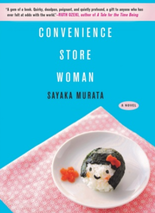A WRITER'S WIT |
My Book World

A compact book at 163 small pages, this novel is a more substantive read than one would think at first. The simple language that the narrator Keiko uses may lull the reader into thinking this will be a simple story. In a way, it is. This young Japanese woman who works in a convenient store shifts to a flashback about her childhood. There she reveals her odd personality, a certain problem with affect, in which she would like to cook and eat a beautiful little blue bird that has died, much to the horror of her mother. Then in primary school, when no teacher appears to break up a fight at recess, Keiko takes it upon herself to hit one of the boys on the skull with a spade. At that point, after getting into trouble, Keiko decides to become a little rule follower, making her, upon high school graduation, a perfect candidate for convenience store worker.
Keiko is unusually attuned to the store’s needs, both at the macro and micro levels—responding to the store’s needs the way a mother might respond to her children. Remaining single, without much apparent interest in sex, Keiko works part-time and sustains a secularly ascetic existence until she’s thirty-six. Then she meets a man, creating the novel’s conflict, and I won’t reveal the ending because it’s pretty odd and yet satisfying. I do have a question for the author. Keiko is often more skilled in managing the store than her male, mostly younger managers (eight of them in eighteen years). Why does her demonstrated competency (all her colleagues acknowledge her abilities) ever put her in a position to become a manager herself? Is this author Murata’s point, a comment on Japanese culture? Or is she more concerned with portraying people who happen not to fit the mold of ordinary citizens and how society treats such people?
NEXT FRIDAY: My Book World | Tobias Wolff's Novel Old School



 RSS Feed
RSS Feed